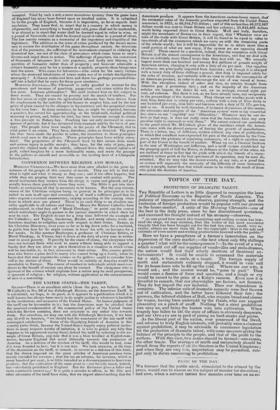PROTECTION OF DRAMATIC TALENT.
TOPICS OF THE DAY.
THE Republic of Letters is as little disposed to recognize the laws of Political Economy as the Republic of North America. The jealousy of importation is, we observe, gaining strength, and the exclusion of foreign production would be popular with our growers in the home-market. A critic of the Morning Chronicle—one of the best in the daily press, since he has discontinued quotation, and exercised his thought instead of his memory—observes, "As one proof how much this translating and cobling system has low- ered the stage, we may mention, that the writer of the most successful tragedy that has been brought out for the last ten years, could, very re- cently, obtain no more than 501. for the copyright : thus is the sale and estimate of even native and sterling productions lowered with the public."
Here we have a paraphrase of a farmer's lamentation on the depression of the corn market ;—the best wheat only fifty shillings a quarter ! what will be the consequences ?—In the event of a war, which would cut off our supplies of vaudevilles and melo-dramas, the nation would find itself utterly destitute of theatrical en- tertainments! It would be unable to command the materials for a sigh, a tear, a smile, or a laugh. The foreign supply of mirth and melancholy suddenly stopped, it would in vain call for its home-born wits to fill up the void. Where are our wits, it would ask ; and the answer would be, "gone to gaol." Then would come a famine of farce and spectricle, and a laugh or cry would be raised to the price of a King's ransom. Even now it is dreadful to remark, that our playwrights are factors, not farmers. They do but import the raw material. Thus our dependence is complete. The inferior soils of dramatic capacity were first thrown out of cultivation, and the better have followed their fate ; the growers, the lettered children of Bull, who require bread and cheese for wages, having been undersold by the Gauls, who can support pleasantry on a pinch of snuff. Nothing but a strict prohibition can save us, and bring the barren wits into cultivation. When tragedy has fallen to 501. the state of affairs is obviously desperate, and our OTWAYS are in peril of pining on beef-steaks and porter. As the liberal part of the nation, ever possessed of the Devil, and adverse to truly English interests, will probably raise a clamour against prohibition, it may be advisable to commence legislation for the protection of dramatic talent, with some measure giving the balance of the principle to the people, and that of the profit to the authors. With this view, two scales should be formed—one comic, the other tragic. The averages of mirth and melancholy should be struck from the reports of all the theatres in the United Kingdoms; and when they are very low, importation may be permitted, sub ject only to duties amounting to prohibition.


















 Previous page
Previous page